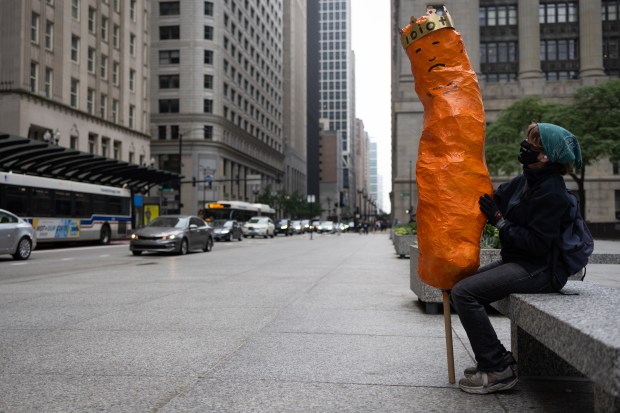A federal judge on Tuesday sentenced a Chicago attorney to 25 years in prison for helping embezzle more than $8 million from a small Bridgeport neighborhood bank that later collapsed, calling him a “delusional” and unrepentant criminal who abused the trust placed in him as a lawyer.
Robert Kowalski, 62, was convicted by a jury last year on all counts of embezzlement, bankruptcy fraud and income tax fraud after a 3 ½-week trial before U.S. District Chief Judge Virginia Kendall, where Kowalski took the unusual and typically ill-advised step of representing himself.
The long-running case featured years of bizarre pretrial hearings that saw Kowalski locked up for violating his bond and filing dozens of motions alleging investigators were hiding evidence and colluding with the judge to railroad him.
It was more of the same during Tuesday’s five-hour sentencing hearing, where Kowalski repeatedly interrupted the judge and prosecutors with complaints of unfair treatment.
For the most part, Kendall listened patiently to Kowalski’s rants. But when he repeatedly interrupted her as she issued the sentence, the judge cut him off with a sharp “Enough.”
“You are absolutely incapable of looking at the reality of this situation and your role in it,” Kendall said to Kowalski, who stood at the lectern in an orange jail outfit with deputy U.S. marshals flanking him. “You fabricated records to the IRS, you fabricated records to the bankruptcy court … You are absolutely delusional that you are a victim of this case. You’re not.”
Kendall said Kowalski’s criminal culpability was further exacerbated by his status as an attorney and that he helped steal from a community bank where “people felt that they could trust that bank to hold their money.”
“You do not have any respect for the rule of law,” she said.
After the judge imposed the 25-year prison term and $7.2 million forfeiture, Kowalski shouted, “This is not right! For all my hard work I get a life sentence? … This is very unfair. This is a day of evil.”
Kowalski was among 14 defendants charged in an alleged multiyear embezzlement scheme that preceded the failure of Washington Federal Bank for Savings, a family-run institution that had been a mainstay in the city’s Bridgeport neighborhood for more than a century.
Kowalski, who was a large debtor of the bank when it was closed by regulators in December 2017, was accused of conspiring with the bank’s president, John Gembara, to rack up millions in collateral-free loans, then lying about and concealing assets and income in bankruptcy proceedings and on his tax returns.
Police records show Gembara, 56, was found dead on Dec. 3, 2017, in the Park Ridge home of a bank customer where he had been staying. An autopsy report showed Gembara was found seated in a chair in his bedroom with a rope tied to the banister and around his neck. His death was ruled a suicide by the Cook County medical examiner’s office.
The sprawling investigation also led to one other high-profile trial. Patrick Daley Thompson, the then-11th Ward alderman and scion of the Daley political dynasty, was convicted in 2021 of two counts of lying to federal regulators about loans he had with Washington Federal and falsely claiming mortgage interest deductions on his tax returns.
Thompson, who by law was forced to step down immediately after his conviction, was sentenced to four months in prison.
Prosecutors said in their opening statement last month that Kowalski used his friendship with Gembara to turn Washington Federal into his own piggy bank, getting collateral-free loans to bankroll his real estate developments and using letters of credit from the bank to fool other creditors.
Kowalski, meanwhile, tried to pin the blame on Gembara, saying his friend ran a scheme that allegedly involved years of bad loans, shifting collateral, forged signatures and even cash buried by one of his customers somewhere in the Cayman Islands.
“He didn’t start out to be a bad man, but his plan was terrible,” Kowalski said in his opening statement to the jury. “It wasn’t George Bailey in ‘It’s a Wonderful Life.’”
The jury deliberated only about an hour before convicting him on all counts.




